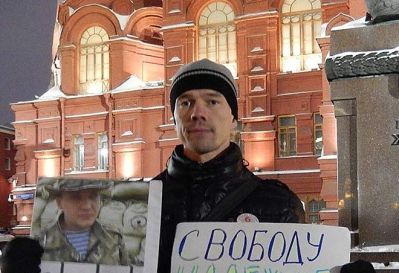Russian court sentences Ildar Dadin to 3 years under new anti-protest law
 Ildar Dadin calling for the release of Nadiya Savchenko
Ildar Dadin calling for the release of Nadiya Savchenko
The first sentence passed under a draconian anti-protest law in Russia has proved even more repressive than demanded by the prosecutor. Judge Natalya Dudar from Moscow’s notorious Basmanny Court has sentenced civic activist Ildar Dadin to three years imprisonment against the two years demanded. Dadin is well-known to Ukrainians for his active support for Euromaidan, which is likely to have contributed to this appalling sentence. It is also probably part of a mounting crackdown on peaceful opposition to the current regime.
In his final address to the court on Monday morning, Dadin stressed that he was not asking for anything, but simply defending his constitutional rights. He demanded that the court observe Russia’s Constitution and terminate this shameful prosecution.
A new Article 212.1 of the Russian Criminal Code was introduced in July 2014. This allows for hefty fines or even 30-day terms of imprisonment on administrative charges. Most worryingly it envisages criminal prosecution for totally peaceful protest. This, as Ildar Dadin rightly pointed out and the judge ignored, is guaranteed under the Constitution.
Article 212.1 envisages a sentence of up to 5 years if a court has issued three rulings on administrative offences within 180 days. He was accused of taking part in protests on Aug 6, Aug 23, Sept 13 and Dec 5 2014. It is quite standard in today’s Russia for police to detain people at entirely peaceful protests, with administrative protocols then drawn up and processed by the courts with no questions asked. It is also customary, and clearly happened in Dadin’s case, for the police to use provocateurs who walk up to a person holding a single-person picket and either cause trouble, or simply wait until the police react to what is no longer one solitary individuals.
Three activists were arrested in January this year – on Jan 16 - 75-year-old pensioner Vladimir Ionov, whose sentence is due any day and Mark Galperin, and then on Jan 30 Dadin, who was placed under house arrest. Each was charged with having committed four ‘infringements’ of the rules on holding and organizing public events in the space of 180 days.
Memorial HRC declared Ildar Dadin to be a political prisoner, and called the prosecution of Ionov and Galperin politically motivated. It stated on Feb 4 that the new legislation destroys freedom of peaceful assembly in Russia.
Article 212.1 breaches Russia’s Constitution and legislation, as well as international law for a number of reasons. It imposes double punishment for the same actions, first via administrative legislation, then criminal. The criminal charges can carry a term of imprisonment of from 3 to 5 years despite the fact that the supposed ‘offences’ are of a formal nature and do not present any danger to the public.
The use of provocateurs was standard in Soviet times, so too were prison sentences for expressing ones views.
See also: Russian prosecutor demands 3 years for 75-year-old Kremlin critic





